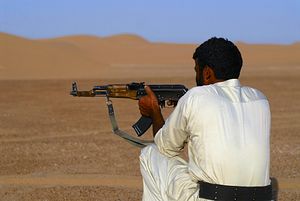The upheaval inside the Muslim world since the beginning of the Arab Spring and now with the Islamic State in Syria, Iraq, the war in Yemen, and its consequences are difficult phenomena to understand. This article provides a brief review of the two security challenges that China has to face in the Middle East.
The first one is related to the well-known “go global” trend that began at the beginning of this century and that touches almost all sectors of the Chinese economy. Much ink has been spilled analyzing the repercussions of the war Libya for Chinese investments and the Chinese attitude towards risk-management and risk-prevention in volatile countries. Briefly, China learned a lesson and has henceforth acted according to its economic, military and diplomatic capabilities to prevent “another Libya.” After the massive evacuation of some 30,000 Chinese citizens and the loss of assets and investments worth several billion dollars, China’s diplomacy has focused on the risk-prevention side.
The cases of Iraq, and more recently Yemen, have demonstrated that the plans for evacuation had been carefully crafted and studied. As soon as the risk reached a certain level, all Chinese expats were evacuated in an orderly and timely manner. The images of a Chinese warship docking in Yemen and the special forces protecting the Chinese and foreign civilians during the boarding showed a caring government to the Chinese at home and a confident China abroad. Indeed, when journalists asked if the U.S. government was going to follow the Chinese example to use military assets and evacuate the American citizens still in Yemen, the State Department spokesperson admitted that no similar plan was on the table.
Overall, although China cannot afford to dispatch troops to try to stop regional wars – and has no intention of doing so – a balanced and skillful use of diplomatic and military tools greatly helps Beijing to contain the damage at minimum cost. Sun Degang, Deputy Director of Shanghai International Studies University’s Middle East Studies Institute, uses the term “soft military presence” (柔性军事存在 rouxing junshi cunzai) to describe Chinese military engagement in the region.
The second issue is the connection between the radicalization of Islam in the Middle East and the situation in China’s western regions. In the past, the main target of Chinese efforts abroad in the counterterrorism domain was the East Turkestan Islamic Movement (ETIM). Cooperation to capture and extradite ETIM has been recurrent and problematic topic in the Sino-Turkish relations; a recent editorial published in the Global Times makes clear that this is still the case. However, it should be noted that the major “crime” of the ETIM is its separatist vocation rather than the religion of its members. Now the situation is changing and the “Islam” feature that was used to convince other countries about the fact that the ETIM is not just about being a group of dangerous separatists, but a global threat, is becoming more evident every day. The extent of the Islamic radicalization of the ETIM and its affiliated groups is dangerously unknown.
In December 2014, the Global Times reported that “various sources” had confirmed that around 300 Chinese nationals are fighting for the Islamic State. In January, Hua Chunying, the spokesperson of the Chinese Ministry of Foreign Affairs, neither confirmed nor denied the presence of Chinese citizens fighting in Syria. Although the reticence of Chinese officials is understandable and the number “300” itself is likely to be incorrect, it is fairly safe to assume that a certain number of Chinese nationals have joined the Islamic State.
Finally, a few days ago the Chinese website Guancha republished images from an article that originally appeared in the Daily Mail. The article was describing the lives of some of the foreigners who had joined the Peshmerga’s International Brigade, usually ex-soldiers who had chosen to join the fight against the Islamic State to “do the right thing.” Although in the article there is no reference to China, three pictures were of interest to China watchers. In one of them, on a wall against which weapons were leaning, it is possible to read three sentences in Chinese: “正义必胜,” “中国必胜,” and “我爱中国” (“Justice must win,” “China must win,” and “I/we love China”). In the two group pictures, an Asian man is holding a gun among the fighters. If these images reveal Chinese nationals fighting also against the Islamic State, a completely new scenario emerges. One of the main reasons for China’s hesitance to expand its military presence in the region is the fear that groups more ferocious than the ETIM will retaliate against Beijing. The comments below the pictures offer a variety of reactions from Chinese netizens. Some claim that the man is a foreign-born Chinese, others accuse Western media of having fabricated the pictures, while still others do not want their alleged fellow citizen to return home. Finally, some hail him as a hero avenging the terrorist attack in Kunming.
It is still too early to determine the implications of Chinese possibly fighting both against and for the Islamic State. Still, it is clear that the road ahead for Chinese diplomacy will be testing. The Middle East has always been a challenge for aspiring and established powers. Is China ready for it?
Andrea Ghiselli is a PhD Candidate at Fudan University, a Non-Resident Research Assistant for the Torino World Affairs Institute, and a Contributing Analyst for Wikistrat.

































